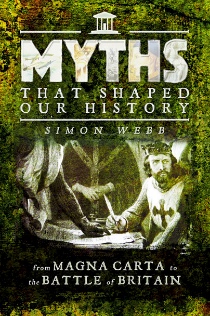Myths That Shaped Our History Book Review
Posted: 2017-12-05
There are some history books that you can enjoy without much thought. The new book by Simon Webb is definitely not that kind of publication. Myths That Shaped Our History: from Magna Carta to the Battle of Britain is a thought-provoking look at how what we think we know about major historical events is wrong, and more importantly, how what we think we know about those events helps shape how we define what it means to be British.
There are many books that re-examine historical events and try to shed new light on them, disclose new information, or simply reinterpret the facts in light of modern research. Myths That Shaped Our History goes far beyond new research and examines how the same themes resonate throughout British history and that those themes have become far more important to our national consciousness than the actual events.
Webb takes 10 major events in British history - and a few surprising 'minor' events and looks at how our understanding of what happened is a) generally wrong, and b) says a lot about how we really want to think of ourselves.
The ten events are Magna Carta, the Battle of Agincourt, the Spanish Armada, Mutiny on the Bounty, the Battle of Waterloo, Florence Nightingale4 at Scutari, the Suffragettes, the 'Belle Epoque' of Edwardian Britain, the British Generals of WWI ('Lions led by Donkeys'), and the Battle of Britain.
In each case, the author examines our commonly held beliefs about the event (the Myth) and what really happened as far as historical records allow us to determine. He then shows how the same themes emerge again and again throughout British history. Common themes include sorting out Europe's problems for them, dealing with a threat from foreign invaders, the little person standing up against authority (David vs Goliath), and Britain as the bringer of law and democracy.
Some of the Myths won't prove too controversial for readers with an interest in history. For example, there have been numerous articles and books in recent years re-examining Magna Carta and revealing it not as a blow for democracy but as a bid by self-interested nobles to preserve their own power.
Many of the Myths will be much more controversial. For example, an examination of military records reveal that far from transforming the military hospital at Scutari, Florence Nightingale actually made things far, far worse for the wounded soldiers in her care, and Nightingale's hospital had the worst mortality rate of any British hospital in the Crimea.
That doesn't diminish the long-term impact that Nightingale had on improving nursing care, but much of that impact was a result of the mythology that developed around her as the 'Lady with the Lamp'. It was that myth that helped change Victorian attitudes more than what good - if any - she actually achieved in the Crimea.
Some of the events may be surprising; the Mutiny of the Bounty chapter for one. It is hardly a major episode in British history, but what it reveals about British attitudes speaks volumes about how we like to think of ourselves. Just for the record, Captain Bligh was not a vindictive, cruel leader; he was actually one of the easiest-going captains in the navy, and it was not until poets like William Wordsworth, an acquaintance of Fletcher Christian, wrote poems slanting events in Christian's favour, that the myth of cruel Captain Bligh took shape.
I found Myths That Shaped Our History to be a wonderfully readable book, exceptionally well-researched, and absolutely delightful to read, even if it did make me re-examine what I thought I knew about British history.
Myths That Shaped Our History is published by Pen and Sword Books and is available from the publisher and on Amazon.
<< A History of Sussex Book Review - The Real Guy Fawkes | Book Review >>
Attraction search


